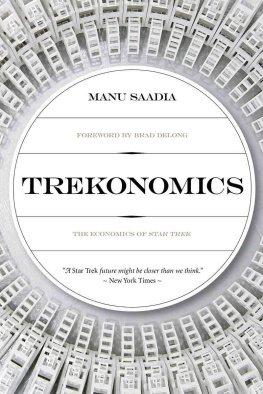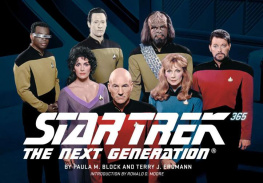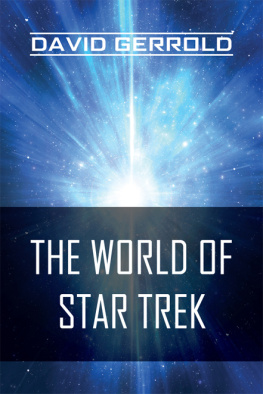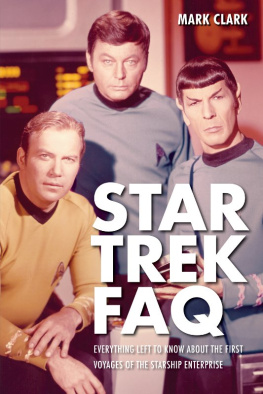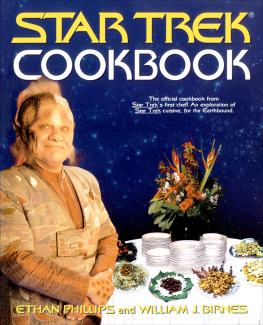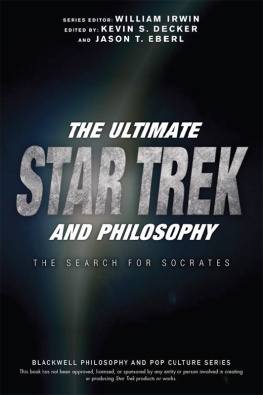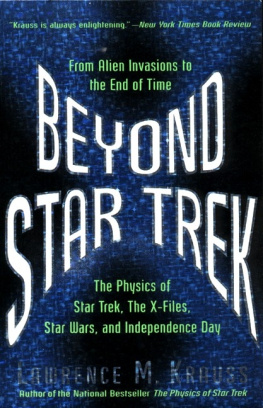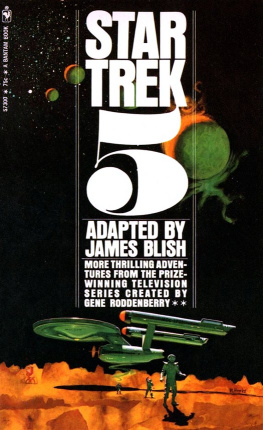PRAISE FOR MANU SAADIA
Manu Saadia proves that Star Trek is an even more valuable cultural icon than we ever suspected.
Charlie Jane Anders, Hugo Award winner, editor in chief, io9
In Trekonomics, Saadia reminds us of what made Star Trek such a bold experiment in the rst place: its Utopian theme of human culture recovering from capitalism. Smart, funny, and wise, this book is a great work of analysis for fans of Star Trek and a call to arms for fans of economic justice.
Annalee Newitz, tech culture editor, Ars Technica
To understand the ctional world of Star Trek is to understand not only the forces that drive our real world, but also the changes that are necessary to improve it. Manus book will change the way you see three different universes: the one that Gene Roddenberry created, the one were in, and the one were headed toward.
Felix Salmon, senior editor, Fusion
TREKONOMICS
MANU SAADIA
Copyright 2016 Manu Saadia
All rights reserved.
No part of this book may be reproduced, or stored in a retrieval system, or transmitted in any form or by any means, electronic, mechanical, photocopying, recording, or otherwise, without express written permission of the publisher.
Published by Pipertext Publishing Co., Inc., in association with
Inkshares, Inc., San Francisco, California
www.pipertext.com
www.inkshares.com
Edited and designed by Girl Friday Productions
www.girlfridayproductions.com
Cover design by Jennifer Bostic
Cover art by John Powers
ISBN: 9781-941758755
e-ISBN: 9781-941758762
Library of Congress Control Number: 2016931451
First edition
To Lazare, our chief engineer, and to my father, Yossef Saadia.
CONTENTS
The Absence of Money in Star Trek
The Meaning of Work in Star Treks Society
The Replicator
Natural Limits and Technology Substitution
Free Riding and Negative Externalities in a Post-Scarcity World
Sources of Trekonomics in Classic Science Fiction
The Psychology of Utopia
The Ferengis, Interstellar Capitalists
Prospects for Trekonomics in the Real World
I have shown how the ideas of progression and of the indefinite perfectibility of the human race belong to democratic ages. Democratic nations care but little for what has been, but they are haunted by visions of what will be; in this direction their unbounded imagination grows and dilates beyond all measure. Here then is the wildest range open to the genius of poets, which allows them to remove their performances to a sufficient distance from the eye. Democracy shuts the past against the poet, but opens the future before him.
Alexis de Tocqueville, Democracy in America
It no longer seemed so important whether the world was Adam Smith or Karl Marx. Neither made very much sense under the new circumstances.
Isaac Asimov, I, Robot
FOREWORD
BY BRAD DELONG
Live long and prosper. Beam me up, Scotty. The needs of the many outweigh the needs of the few, or the one. Fascinating. Make it so. Logic is the beginning of wisdom, not the end. Im a doctor, not a bricklayer. Highly illogical. You can stop it! Stop it? Im counting on it!
Over the past half century Star Trek has woven itself into our sociocultural DNA. It provides a set of powerful, striking, and beneficial ideas that help us here in our civilization think better. Even those of us who are economists.
Why should the imaginary dreams of science fiction help us think better?
Back in 1759, the man who was to become the first economist, young Adam Smith, a Scottish moral philosopher on the make, wrote in his Theory of Moral Sentiments of how a stranger to human nature, [seeing] the indifference of men about the misery of their inferiors... [would conclude that] pain must be more agonizing, and the convulsions of death more terrible, to persons of higher rank, than to those of meaner stations.
There is no such alien stranger. Smith is telling us of somebody who does not exist. Its a very short eighteenth-century science-fiction story. Why? Because we love to tell one another false stories, to converse about imaginary people, be it in philosophical treatises or in television serials. It is what we do as humans.
^
If an alien intellect, vast and cool and unsympathetic (or vast and warm and sympathetic), were to scrutinize us from afar, it would inevitably conclude that telling each other false stories is a major part of what we are, and it would wonder why we communicateor miscommunicate in this way.
Everyone is engaged in dream-work. Everyone chatters about their imaginary friends. Some are ascribing agency, motivation, and intelligence to patterns of societal forces that are the emergent properties of distributed interactions. Others are writingor filmingfiction.
Our fictions are, collectively, the dream-work of humanity. We dream these dreams to amuse ourselves, but also so that we will be more sane when we awake.
No wonder, then, that investors and economists also gab about imaginary friends, frenemies, and unfriends with names like Ms. Market and confidence and global risk tolerance as they try to understand things called asset prices. They too are doing dream-work.
But in some ways the most profound thinking, the deepest dreamwork, is being done by science fiction. Thats because science-fiction writers and fans are explicitly aware that what they are engaged in is humanitys dreaming.
The Prime Directive of Star Trek: The Original Series was a way to process Americas 1960s misadventure in Vietnam. I first recognized that Star Trek was a very different kind of show back in the 1960s, when at the end of Arena, Kirk neither killed nor civilized nor brought democracy to the Gorn, but let him go to make his own destiny.
^
Gene Roddenberry mostly wanted to find a way to get people to pay him to make up stories, so that he wouldnt have to take a job that required a lot of heavy lifting. But he also wanted to tell particular stories. The stories he wanted to tell were those that would be the dreamwork for a better future.
He wanted to tell stories of a progressive humanity. He wanted to tell stories about people in a better future in which governmental institutions were smart enough to stay out of Vietnam and people werent obsessed with leaky roofs and food shortages. He wanted to tell stories in which racial prejudice was as silly and stupid as it, in fact, is. He wanted to tell stories in which it would be normal for a woman to be if not number one at least number two as first officer of a starship. He wanted to tell stories in which everyoneeven the disposable Red Shirtswas an officer, a trained and well-educated professional treated with dignity and respect by her peers and superiors.
In turn, Gene Roddenberrys successorsshowrunners, writers, actors, set designers, and all the resttook on the same project: to do the dream-work of a better future. As North Atlantic civilization bobbled the historical opportunity that was the collapse of the Soviet Empire, Star Trek VI: The Undiscovered Country and Star Trek: Deep Space Nine pointed to better directions. Gene Roddenberry made Star Trek a collective dreaming about a better future, and not just a Western or a medieval romance with lightsabers, whooshing spaceships, and exploding planets bolted onto it.
Four hundred years ago, in almost all human societies, being rich relative to your neighbors mattered a lot. If you werent rich, you were malnourishedperhaps not getting the nutrients for your immune system to function well, perhaps not getting the calories you needed to reliably ovulate, and probably losing at least one tooth with every baby. And, you were short. In the eighteenth century, Adam Smiths England was the richest society in the world, yet the orphans sent to sea by the charity that was the Marine Society were close to eight inches shorter than the aristocrats sons sent to Sandhurst to become army officers. Plus, your roof leaked.
Next page
